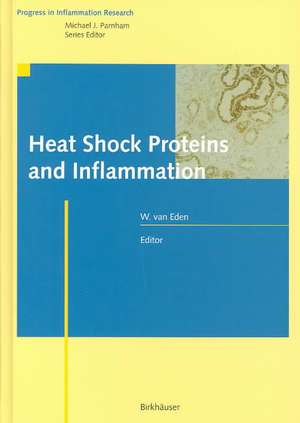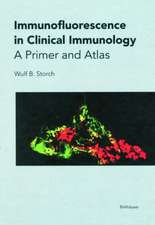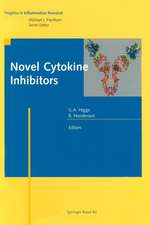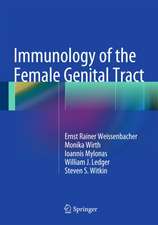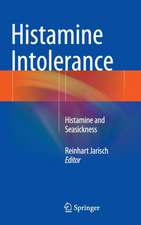Heat Shock Proteins and Inflammation: Progress in Inflammation Research
Editat de Willem van Edenen Limba Engleză Hardback – 24 oct 2003
| Toate formatele și edițiile | Preț | Express |
|---|---|---|
| Paperback (1) | 1094.44 lei 6-8 săpt. | |
| Birkhäuser Basel – 24 oct 2012 | 1094.44 lei 6-8 săpt. | |
| Hardback (1) | 1108.51 lei 6-8 săpt. | |
| Birkhäuser Basel – 24 oct 2003 | 1108.51 lei 6-8 săpt. |
Din seria Progress in Inflammation Research
- 5%
 Preț: 1615.04 lei
Preț: 1615.04 lei - 5%
 Preț: 1433.10 lei
Preț: 1433.10 lei - 5%
 Preț: 723.05 lei
Preț: 723.05 lei - 18%
 Preț: 950.21 lei
Preț: 950.21 lei - 15%
 Preț: 648.42 lei
Preț: 648.42 lei - 5%
 Preț: 1300.72 lei
Preț: 1300.72 lei - 5%
 Preț: 1103.95 lei
Preț: 1103.95 lei - 5%
 Preț: 1061.93 lei
Preț: 1061.93 lei - 5%
 Preț: 715.35 lei
Preț: 715.35 lei - 5%
 Preț: 1098.63 lei
Preț: 1098.63 lei - 5%
 Preț: 657.90 lei
Preț: 657.90 lei - 5%
 Preț: 717.93 lei
Preț: 717.93 lei - 5%
 Preț: 996.71 lei
Preț: 996.71 lei - 5%
 Preț: 1413.72 lei
Preț: 1413.72 lei - 5%
 Preț: 1102.46 lei
Preț: 1102.46 lei - 5%
 Preț: 1102.82 lei
Preț: 1102.82 lei - 5%
 Preț: 991.70 lei
Preț: 991.70 lei - 5%
 Preț: 1115.86 lei
Preț: 1115.86 lei - 5%
 Preț: 720.31 lei
Preț: 720.31 lei - 5%
 Preț: 1611.76 lei
Preț: 1611.76 lei - 5%
 Preț: 654.23 lei
Preț: 654.23 lei - 5%
 Preț: 1414.64 lei
Preț: 1414.64 lei - 5%
 Preț: 652.77 lei
Preț: 652.77 lei - 5%
 Preț: 1099.94 lei
Preț: 1099.94 lei - 5%
 Preț: 1856.59 lei
Preț: 1856.59 lei - 15%
 Preț: 644.95 lei
Preț: 644.95 lei - 5%
 Preț: 1108.72 lei
Preț: 1108.72 lei - 5%
 Preț: 658.46 lei
Preț: 658.46 lei - 24%
 Preț: 801.38 lei
Preț: 801.38 lei - 5%
 Preț: 715.19 lei
Preț: 715.19 lei - 5%
 Preț: 1807.08 lei
Preț: 1807.08 lei - 5%
 Preț: 721.40 lei
Preț: 721.40 lei - 5%
 Preț: 991.70 lei
Preț: 991.70 lei - 5%
 Preț: 720.68 lei
Preț: 720.68 lei - 5%
 Preț: 1100.09 lei
Preț: 1100.09 lei - 15%
 Preț: 577.87 lei
Preț: 577.87 lei - 5%
 Preț: 652.77 lei
Preț: 652.77 lei - 5%
 Preț: 653.35 lei
Preț: 653.35 lei - 5%
 Preț: 650.25 lei
Preț: 650.25 lei - 5%
 Preț: 1116.73 lei
Preț: 1116.73 lei - 5%
 Preț: 1096.98 lei
Preț: 1096.98 lei - 5%
 Preț: 1412.62 lei
Preț: 1412.62 lei - 5%
 Preț: 1420.49 lei
Preț: 1420.49 lei - 5%
 Preț: 721.77 lei
Preț: 721.77 lei - 5%
 Preț: 1102.10 lei
Preț: 1102.10 lei - 5%
 Preț: 1099.20 lei
Preț: 1099.20 lei
Preț: 1108.51 lei
Preț vechi: 1166.84 lei
-5% Nou
Puncte Express: 1663
Preț estimativ în valută:
212.14€ • 218.86$ • 179.54£
212.14€ • 218.86$ • 179.54£
Carte tipărită la comandă
Livrare economică 04-18 martie
Preluare comenzi: 021 569.72.76
Specificații
ISBN-13: 9783764369323
ISBN-10: 3764369329
Pagini: 280
Ilustrații: XIII, 280 p.
Dimensiuni: 155 x 235 x 22 mm
Greutate: 0.77 kg
Ediția:2003
Editura: Birkhäuser Basel
Colecția Birkhäuser
Seria Progress in Inflammation Research
Locul publicării:Basel, Switzerland
ISBN-10: 3764369329
Pagini: 280
Ilustrații: XIII, 280 p.
Dimensiuni: 155 x 235 x 22 mm
Greutate: 0.77 kg
Ediția:2003
Editura: Birkhäuser Basel
Colecția Birkhäuser
Seria Progress in Inflammation Research
Locul publicării:Basel, Switzerland
Public țintă
ResearchCuprins
HSP60 and the regulation of inflammation: Physiological and pathological.- Heat shock proteins and suppression of inflammation.- Heat shock proteins in immune response.- Heat shock protein-mediated activation of innate immune cells.- Eukaryotic HSP60: A “danger signal” for T- and natural killer cells.- Heat shock proteins and experimental arthritis.- Heat shock proteins and reactive arthritis.- The development of immune therapy with HSP60 for juvenile idiopathic arthritis.- Heat shock proteins and rheumatoid arthritis.- Heat shock proteins for immunotherapy of rheumatoid arthritis.- Immunity to heat shock proteins and atherosclerosis.- Chaperonins: Chameleon proteins that influence myeloid cells.- Heat shock protein receptors, functions and their effect on monocytes and dendritic cells.- Heat shock protein expression in transplanted kidney.- Mycobacterial heat shock proteins and the bovine immune system.- Microbial infection generates pro-inflammatory autoimmunity against the small heat shock protein alpha B-crystallin and provides the fuel for the development of multiple sclerosis.- HSP60-peptide interference with CD94/NKG2 receptors.
Textul de pe ultima copertă
Heat shock proteins have received ample interest by immunologists over recent years. Initially they were found to be dominantly immunogenic microbial antigens. The connection to inflammation was established when it was uncovered that T cells reactive to hsp60 of mycobacteria had a crucial role in the induction and, more interestingly, regulation of experimental arthritis. Since then, the raised presence of immunity to hsp in virtually all conditions of inflammation, including autoimmune diseases, transplant rejection and atherosclerosis, has emphasised the critical significance of immunity to hsp in inflammatory diseases. Recently, first trials with hsp peptides were undertaken and reported in type I diabetes and in arthritis. As this has stimulated a wide interest in this particular field the book aims at giving an update of these exciting current developments and to provide the basis for understanding the mode of action of hsp based immunotherapeutic interventions. This will include aspects of specific adaptive immunity and aspects of innate immunity.
The book has its focus on immunity to hsp and its impact on the regulation of inflammation. It is of interest to biologists, immunologists, microbiologists and other researchers, but also clinicians interested in the rapidly evolving field of immune-interventions.
The book has its focus on immunity to hsp and its impact on the regulation of inflammation. It is of interest to biologists, immunologists, microbiologists and other researchers, but also clinicians interested in the rapidly evolving field of immune-interventions.
Caracteristici
Focuses on immunity to HSPs and the impact on the regulation of inflammation Includes aspects of specific adaptive as well as innate immunity Gives a basis for understanding the mode of action of HSP-based immunotherapeutic interventions Provides data from experimental model systems as well as clinical research Includes supplementary material: sn.pub/extras
